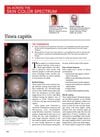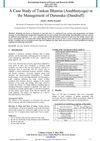 3 citations,
July 2015 in “Australasian Journal of Dermatology”
3 citations,
July 2015 in “Australasian Journal of Dermatology” A man developed an allergic skin reaction to a rosacea treatment and improved after stopping the medication and receiving allergy-specific care.
 42 citations,
September 2018 in “Journal of Fungi”
42 citations,
September 2018 in “Journal of Fungi” Terbinafine and itraconazole are more effective against Microsporum canis than fluconazole and griseofulvin.
 7 citations,
December 2004 in “Medicine”
7 citations,
December 2004 in “Medicine” Knowing how skin works and its diseases helps doctors diagnose and treat skin conditions better.

The conclusion is that common non-infectious scalp diseases often have similar symptoms, making diagnosis challenging.
 32 citations,
September 1989 in “Medical Clinics of North America”
32 citations,
September 1989 in “Medical Clinics of North America” Skin problems are common in lupus, important for diagnosis, and can be triggered by sunlight.
 September 2024 in “Skin Research and Technology”
September 2024 in “Skin Research and Technology” AFM can help diagnose lichen planopilaris by identifying specific hair structure changes.
 1 citations,
January 2019 in “International Journal of Medical Reviews and Case Reports”
1 citations,
January 2019 in “International Journal of Medical Reviews and Case Reports” Treatment with moisturizers improved the skin condition of a girl with a rare genetic skin disorder.
 June 2024 in “Journal of Allergy and Clinical Immunology”
June 2024 in “Journal of Allergy and Clinical Immunology” TSLP affects atopic dermatitis by increasing sebum and reducing fat through IL-4/IL-13 signaling.
1 citations,
January 1980 in “Side effects of drugs annual” Taking too much vitamin A can cause health problems like bone pain and hair loss.
 1 citations,
November 2017 in “International Journal of Research in Medical Sciences”
1 citations,
November 2017 in “International Journal of Research in Medical Sciences” Dermoscopy helps distinguish between scarring and non-scarring hair loss and accurately diagnoses hair and scalp conditions without needing hair plucking.
 2 citations,
July 2018 in “Elsevier eBooks”
2 citations,
July 2018 in “Elsevier eBooks” Trichoscopy is a useful tool for diagnosing and managing hair and scalp conditions, often better than traditional methods.
 67 citations,
April 2007 in “Journal der Deutschen Dermatologischen Gesellschaft”
67 citations,
April 2007 in “Journal der Deutschen Dermatologischen Gesellschaft” Shampoos are designed to clean and improve hair and scalp health, with specific ingredients for different hair types and conditions.
 1 citations,
November 1998 in “Journal of Small Animal Practice”
1 citations,
November 1998 in “Journal of Small Animal Practice” The dog had a Sertoli cell tumor, which was successfully removed with surgery.
October 2015 in “CRC Press eBooks” Trichoscopy is a useful tool for examining and monitoring hair and scalp conditions.
35 citations,
February 2004 in “Veterinary Dermatology” Cutaneous lymphocytosis in cats is a slowly progressing, relatively benign disease affecting older cats, often causing skin lesions and systemic signs.
 April 2024 in “Scientific reports (Nature Publishing Group)”
April 2024 in “Scientific reports (Nature Publishing Group)” Rosemary and neem extract may be an effective natural treatment for dandruff and hair loss.
 61 citations,
October 2005 in “The journal of investigative dermatology. Symposium proceedings/The Journal of investigative dermatology symposium proceedings”
61 citations,
October 2005 in “The journal of investigative dermatology. Symposium proceedings/The Journal of investigative dermatology symposium proceedings” The document concludes that accurate diagnosis is crucial for effectively treating common scalp disorders, which often have similar symptoms.
 10 citations,
March 2015 in “Journal of dermatology”
10 citations,
March 2015 in “Journal of dermatology” The boy's severe skin disorder is caused by two new mutations in his TGM1 gene.
 October 2022 in “The Journal of Family Practice”
October 2022 in “The Journal of Family Practice” Tinea capitis is a scalp fungal infection in children that can cause hair loss, scaling, and other symptoms.
 10 citations,
January 2018 in “Seminars in Reproductive Medicine”
10 citations,
January 2018 in “Seminars in Reproductive Medicine” The document concludes that women with PCOS need a comprehensive care model that covers reproductive, metabolic, and psychological health to improve their quality of life.
 March 2022 in “Journal of South Asian Association of Pediatric Dentistry”
March 2022 in “Journal of South Asian Association of Pediatric Dentistry” Dentists should start preventive treatments early for children with Ichthyosis Vulgaris to avoid dental problems.
 May 2024 in “Australasian journal of dermatology”
May 2024 in “Australasian journal of dermatology” A man with a type of skin lymphoma had unusual yellowish skin growths despite normal blood lipid levels, and treatment reduced some symptoms but not the growths.
 January 2024 in “International journal of advanced biochemistry research”
January 2024 in “International journal of advanced biochemistry research” Fluralaner successfully treated dogs with severe demodicosis in 2 months.
 May 2024 in “International Journal of Science and Research (IJSR)”
May 2024 in “International Journal of Science and Research (IJSR)” Tankan Bhasma mixed with coconut oil effectively reduced dandruff and improved scalp health.
 January 2019 in “Elsevier eBooks”
January 2019 in “Elsevier eBooks” Early detection and skin biopsies are crucial for treating skin cancer and diagnosing various skin conditions.
7 citations,
May 2012 in “Journal of veterinary diagnostic investigation” Some young Angus cattle had skin problems due to not enough vitamin A, which got better after they were given more vitamin A.
 9 citations,
April 1987 in “International Journal of Dermatology”
9 citations,
April 1987 in “International Journal of Dermatology” Stopping the depression medication improved the woman's eyebrow hair loss, and a treatment for a skin condition caused by mites was effective.
22 citations,
August 1940 in “The journal of investigative dermatology/Journal of investigative dermatology” Rats with a pellagra-like skin condition were cured by a vitamin found in yeast, later identified as vitamin B6.
 14 citations,
January 2015 in “Skin appendage disorders”
14 citations,
January 2015 in “Skin appendage disorders” Misdiagnosis of LPP in AGA patients can cause hair transplant issues.
3 citations,
September 2021 in “BioEssays” Dandruff might be caused by changes in how hair follicles naturally release oils and an immune response to this imbalance.
























